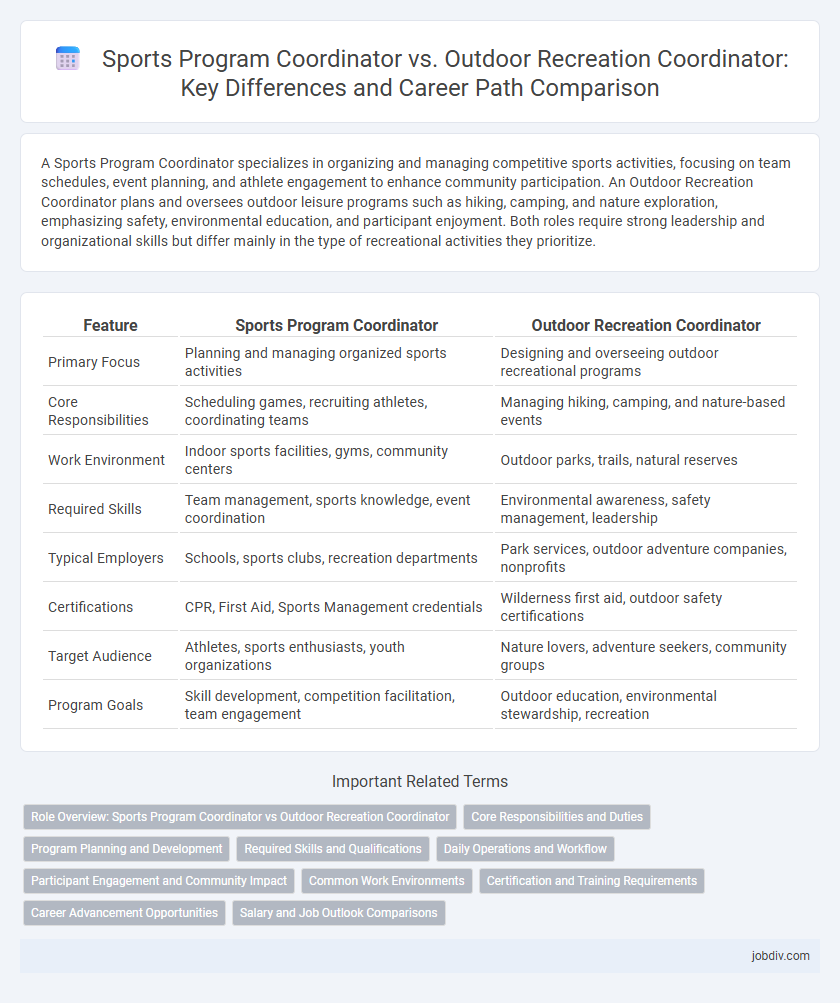A Sports Program Coordinator specializes in organizing and managing competitive sports activities, focusing on team schedules, event planning, and athlete engagement to enhance community participation. An Outdoor Recreation Coordinator plans and oversees outdoor leisure programs such as hiking, camping, and nature exploration, emphasizing safety, environmental education, and participant enjoyment. Both roles require strong leadership and organizational skills but differ mainly in the type of recreational activities they prioritize.
Table of Comparison
| Feature | Sports Program Coordinator | Outdoor Recreation Coordinator |
|---|---|---|
| Primary Focus | Planning and managing organized sports activities | Designing and overseeing outdoor recreational programs |
| Core Responsibilities | Scheduling games, recruiting athletes, coordinating teams | Managing hiking, camping, and nature-based events |
| Work Environment | Indoor sports facilities, gyms, community centers | Outdoor parks, trails, natural reserves |
| Required Skills | Team management, sports knowledge, event coordination | Environmental awareness, safety management, leadership |
| Typical Employers | Schools, sports clubs, recreation departments | Park services, outdoor adventure companies, nonprofits |
| Certifications | CPR, First Aid, Sports Management credentials | Wilderness first aid, outdoor safety certifications |
| Target Audience | Athletes, sports enthusiasts, youth organizations | Nature lovers, adventure seekers, community groups |
| Program Goals | Skill development, competition facilitation, team engagement | Outdoor education, environmental stewardship, recreation |
Role Overview: Sports Program Coordinator vs Outdoor Recreation Coordinator
A Sports Program Coordinator manages the design, implementation, and promotion of athletic events and leagues, focusing on team sports, individual competitions, and community engagement. An Outdoor Recreation Coordinator specializes in planning and overseeing outdoor activities such as hiking, camping, and adventure programs, emphasizing environmental education and safety protocols. Both roles require strong organizational skills and knowledge of recreational facilities but differ in focus areas: structured sports versus nature-based experiences.
Core Responsibilities and Duties
Sports Program Coordinators manage the planning, organization, and execution of athletic events, leagues, and fitness programs, ensuring participant engagement and safety. Outdoor Recreation Coordinators specialize in developing and overseeing activities such as hiking, camping, and adventure tours, emphasizing natural resource management and environmental awareness. Both roles require collaboration with stakeholders, budget management, and promotion of recreational opportunities, but their focus diverges between structured sports settings and natural outdoor experiences.
Program Planning and Development
Sports Program Coordinators focus on designing and implementing athletic activities tailored to diverse age groups, emphasizing skill development and competitive play. Outdoor Recreation Coordinators specialize in planning and managing nature-based activities such as hiking, camping, and adventure sports, ensuring safety and environmental sustainability. Both roles require expertise in program planning and development, but Sports Coordinators prioritize sports facility management while Outdoor Coordinators emphasize natural resource coordination.
Required Skills and Qualifications
Sports Program Coordinators require strong organizational skills, knowledge of sports management, and certifications in first aid or CPR, along with experience in team leadership and event planning. Outdoor Recreation Coordinators must possess expertise in wilderness safety, environmental education, and proficiency in outdoor guiding techniques, often holding certifications in outdoor leadership or emergency response. Both roles demand excellent communication skills and the ability to coordinate diverse groups, but the Sports Program Coordinator emphasizes athletic program development while the Outdoor Recreation Coordinator focuses on promoting safe and sustainable outdoor activities.
Daily Operations and Workflow
A Sports Program Coordinator manages daily operations by organizing sporting events, coordinating schedules, and overseeing athlete registration and compliance to ensure smooth program delivery. An Outdoor Recreation Coordinator focuses on planning and supervising outdoor activities, managing equipment inventory, and coordinating safety protocols for participants in nature-based experiences. Both roles require strong communication skills and the ability to adapt workflows to dynamic environments, but the Sports Program Coordinator emphasizes structured event management while the Outdoor Recreation Coordinator prioritizes environmental stewardship and risk management.
Participant Engagement and Community Impact
Sports Program Coordinators drive participant engagement by organizing diverse athletic events and leagues, fostering teamwork and physical fitness across community demographics. Outdoor Recreation Coordinators emphasize immersive nature activities, promoting environmental awareness and wellness through hiking, camping, and outdoor education programs. Both roles significantly contribute to community impact by enhancing social cohesion, encouraging active lifestyles, and supporting inclusive access to recreational opportunities.
Common Work Environments
Sports Program Coordinators and Outdoor Recreation Coordinators primarily operate in community centers, parks, and recreational facilities where they design and manage activities tailored to diverse populations. Both roles frequently collaborate with schools, municipal agencies, and nonprofit organizations to facilitate events and promote active participation. Their work environments often include outdoor settings such as sports fields, trails, and campgrounds, requiring adaptability to varying weather and conditions.
Certification and Training Requirements
Sports Program Coordinators typically require certifications such as CPR, first aid, and specialized sports management credentials, along with training in coaching techniques and event planning. Outdoor Recreation Coordinators often need wilderness first aid, lifeguard certification, and training in environmental safety and survival skills. Both roles value experience in leadership and strong knowledge of activity-specific regulations to ensure participant safety and program effectiveness.
Career Advancement Opportunities
Sports Program Coordinators typically advance by managing larger athletic departments or specializing in competitive sports event planning, leveraging skills in team leadership and facility operations. Outdoor Recreation Coordinators often progress to roles in environmental education or park management, emphasizing expertise in wilderness safety and sustainable recreation practices. Both career paths offer growth through certifications and experience in program development, expanding opportunities in public, private, or nonprofit sectors.
Salary and Job Outlook Comparisons
Sports Program Coordinators earn an average salary ranging from $45,000 to $60,000 annually, with job growth projected at 8% over the next decade, driven by increasing community sports initiatives. Outdoor Recreation Coordinators typically have salaries from $40,000 to $55,000, with a faster job growth rate of 10%, reflecting rising demand for outdoor adventure and sustainable tourism programs. Both roles require strong organizational skills but Outdoor Recreation Coordinators benefit from expanding eco-tourism sectors impacting salary and career opportunities.
Sports Program Coordinator vs Outdoor Recreation Coordinator Infographic

 jobdiv.com
jobdiv.com